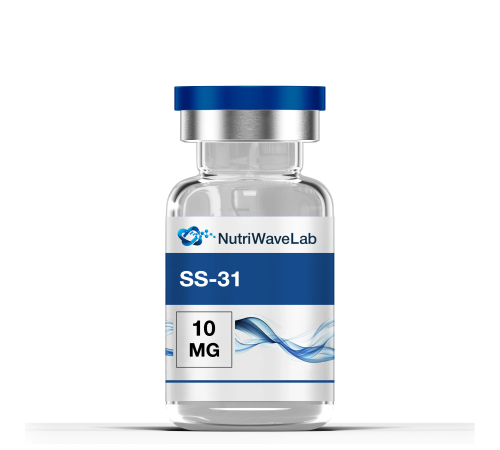
SS-31 (Elamipretide)
Introduction
SS-31, also known as Elamipretide, is a synthetic peptide that has garnered significant attention in the medical research community for its potential mitochondrial protective properties. It is primarily investigated for its ability to improve mitochondrial function and has applications in a range of diseases associated with mitochondrial dysfunction, such as heart failure, kidney diseases, and neurodegenerative disorders.
Clinical Benefits
SS-31 offers several promising benefits that target the underlying mitochondrial dysfunctions in various diseases:
• Mitochondrial Protection: SS-31 is designed to penetrate cells and localize within mitochondria where it binds to cardiolipin, a lipid essential to the optimal function of mitochondrial membranes. This interaction helps stabilize mitochondrial structures and enhance their function.
• Cardiovascular Diseases: In heart failure and ischemia-reperfusion injury models, SS-31 has demonstrated an ability to reduce oxidative stress, preserve mitochondrial function, and improve cardiac outcomes.
• Neurodegenerative Diseases: Its potential to protect neuronal cells by stabilizing mitochondrial function suggests a role in treating diseases like Parkinson’s and Alzheimer’s.
• Renal and Skeletal Muscle Function: SS-31 has shown promise in improving the function and endurance of skeletal muscles and protecting against acute and chronic kidney injuries by enhancing mitochondrial efficiency.
Mechanism of Action
SS-31 primarily works by targeting the mitochondria, crucial powerhouses of the cell that generate energy. Its mechanism involves:
1. Mitochondrial Membrane Stabilization: By binding to cardiolipin, SS-31 stabilizes the inner mitochondrial membrane, improving electron transport chain efficiency and reducing the leakage of pro-apoptotic factors.
2. Reduction of Oxidative Stress: It decreases the production of reactive oxygen species (ROS) within mitochondria, thereby reducing oxidative stress and preventing damage to mitochondrial DNA, proteins, and lipids.
3. Enhancement of ATP Production: Improved mitochondrial function results in more efficient ATP synthesis, which is vital for cell vitality and function.
Research and Development
Ongoing clinical trials are exploring SS-31’s efficacy in a variety of conditions, including age-related decline, cardiovascular diseases, and rare mitochondrial disorders. The research focuses on understanding how enhancing mitochondrial function can attenuate disease progression and improve quality of life.
Conclusion
SS-31 (Elamipretide) represents a pioneering approach in the treatment of diseases linked to mitochondrial dysfunction. Its ability to enhance mitochondrial efficiency and protect against oxidative damage holds potential for substantial therapeutic impact across multiple clinical areas. Continued research and clinical trials will help to better understand and harness SS-31’s full therapeutic potential, potentially leading to new treatments for chronic and debilitating conditions.
Product Use: THIS PRODUCT IS STRICTLY FOR
SCIENTIFIC RESEARCH PURPOSES ONLY. It should only be used in laboratory
settings. All product information on this website is provided solely for
educational purposes. The law strictly prohibits introducing this product into
the body of humans or animals. Only licensed professionals should handle this
product. This product is not a drug, food, or cosmetic and should not be
improperly classified or used as such.
There are no reviews for this product.
No questions about this product.
